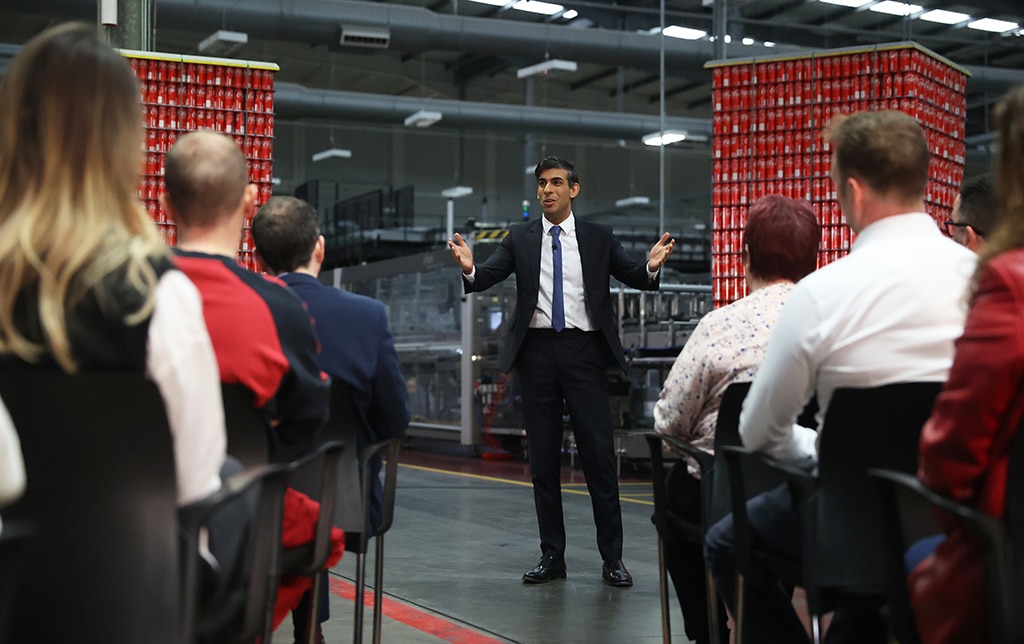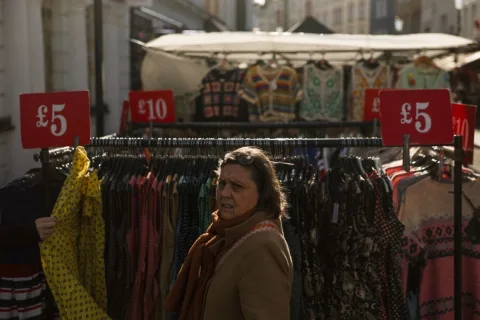LONDON: British Prime Minister Rishi Sunak visited Northern Ireland on Tuesday to convince pro-UK unionists to back his breakthrough deal with the European Union that overhauls post-Brexit trading rules in the province. Sunak and European Commission president Ursula von der Leyen proclaimed Monday a "new chapter" in relations after years of Brexit tensions as they agreed the new pact.
It follows more than a year of tense talks over the "Northern Ireland Protocol", which has unsettled the province 25 years on from a historic peace deal that ended three decades of armed conflict.
Agreed in 2020 as part of Britain's EU divorce, the original pact kept the province in the European single market for physical goods and subject to different customs rules than the rest of the United Kingdom, angering pro-UK unionists there and euroskeptics in London. While the new framework has been generally well received, it has yet to secure the backing of the Democratic Unionist Party (DUP), Northern Ireland's largest pro-UK party, which is needed to resume power-sharing in the province.
The DUP has been refusing to re-enter the devolved government in Belfast for a year, mainly in protest at the protocol, which it said cut Northern Ireland adrift from the rest of the UK. DUP leader Jeffrey Donaldson said the party would assess whether the agreement met its tests for returning to the Stormont assembly. Sunak told BBC radio that his deal "will make a hugely positive difference".
"And that's what I'll be talking to people about today, listening to them and explaining how this agreement is going to make that positive difference." On a later visit to a Coca-Cola factory in Lisburn, the prime minister said the deal would create "the world's most exciting economic zone" with access to EU and UK markets. "Nobody else has that. No one. Only you guys: only here, and that is the prize," he said.
'Delicate balance'
The new so-called Windsor Framework creates a "green" largely check-free lane for goods coming from the rest of the UK that are intended to stay in Northern Ireland, without heading into Ireland and the EU's single market. UK-approved food and medicines will be fully available in Northern Ireland, and the deal would also limit, but not scrap, oversight of the arrangements by the EU's European Court of Justice (ECJ).
Donaldson told Sky News on Monday that a key issue would be the extent of EU law applicable to Northern Ireland. "The ECJ applies where EU law applies. A key focus for us in examining this agreement will be to determine which EU laws apply, in what circumstances do they apply and why do they apply," he said.
"We don't want a situation where EU law cuts across our ability to trade with the rest of the UK."
Sunak appears to have the backing of most Brexiteer MPs in his own party, though his predecessor Boris Johnson has yet to react. The deal also has the support of international partners, with French President Emmanuel Macron calling it an "important decision" and US President Joe Biden highlighting the economic opportunities that would be "created by this stability and certainty."
A key plank of the agreement is the "Stormont brake", which gives the Northern Ireland assembly power to initiate a block on any new laws passed by the EU taking effect in the province. "At the heart of the Belfast Good Friday Agreement is the delicate balance that needs to exist in Northern Ireland and that's about respect for the aspirations and identities of all communities," Sunak told the BBC, referring to the landmark 1998 peace accord.
"It's important for businesses to have access to the EU single market, and as long as the people in Northern Ireland consent to that arrangement, then that's why there's a small and limited role for EU law in Northern Ireland. "But crucially... that situation only persists as long as the people are happy with it," he added. - AFP











